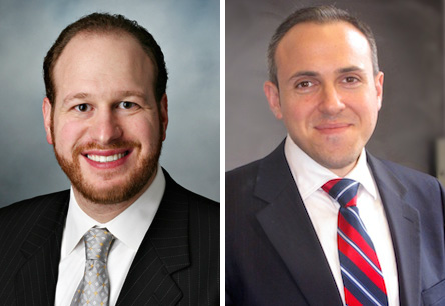Council members David Greenfield and Mark Treyger think drivers should be able to go faster on Ocean Parkway, one of the city's most dangerous streets.

The multi-lane boulevard, running from Church Avenue to Coney Island, is a Vision Zero priority corridor because of its high rate of serious pedestrian injuries and fatalities. Lower speed limits on their own are a proven method of reducing serious crashes. With speed cameras, the the city can enforce the lower limit on Ocean Parkway and reduce the prevalence of driving at lethal speeds.
Greenfield and Treyger claim to be Vision Zero supporters, so why do they want to allow drivers to travel at more dangerous speeds on Ocean Parkway?
"We must recognize the important role that major thoroughfares like Ocean Parkway play in moving high volumes of traffic as efficiently as possible. I am concerned that this lower speed limit will only serve to increase traffic on this extremely busy street without having a real impact on pedestrian safety," Treyger said in a press release. "I am proud to support Vision Zero and the lower speed limit in appropriate areas where it will protect the public, but I do not believe that Ocean Parkway meets this criteria."
The idea that lower speed limits are making traffic worse on Ocean Parkway is ludicrous. When there's a lot of traffic, the congestion is what limits drivers' speeds. The speed limits and camera enforcement affect driver behavior when there's not a lot of traffic -- when Ocean Parkway is a wide-open speedway inviting drivers to hit the throttle.
The whole press release is littered with ridiculous arguments, like equating Ocean Parkway with the Gowanus Expressway.
After the city's default speed limit was lowered from 30 mph to 25 mph last year, according to the press release, "the expectation was that major through-routes like Ocean Parkway and the Gowanus Expressway would remain at their previous speed limits since a higher speed is necessary to carry traffic smoothly."
Let's see... One of these roads has stoplights, crosswalks, sidewalks, and a bicycle path. The other is an elevated expressway designed solely for moving cars and trucks.
Arterial streets like Ocean Parkway comprise 15 percent of the city's street mileage but account for 60 percent of pedestrian fatalities, according to DOT. Raising speed limits on these streets would seriously undermine attempts to achieve the city's Vision Zero goal.
DOT is standing by the 25 mph speed limit in a statement reported by Ditmas Park Corner:
Ocean Parkway is the fourth most dangerous roadway for pedestrians in Brooklyn and its history of serious crashes informed DOT’s decision to reduce the speed limit by 5 mph...
Ocean Parkway saw 64 pedestrians killed or severely injured (KSI) between 2009-2013, including eight pedestrian fatalities. The pedestrian KSI rate for Ocean Parkway was 13.2 per mile over that five-year period. By comparison, the more notorious Queens Boulevard, where DOT recently lowered the speed limit to 25 mph, had a pedestrian KSI per mile of 7.3 over the same five-year period.
Ocean Parkway is a challenging roadway. It serves as a major automobile route through Brooklyn but also as a linear park, bike and pedestrian path, used by many local residents, including children and seniors. A pedestrian struck at 25mph is twice as likely as likely to survive a crash as one struck at 30mph. NYCDOT believes that the lower speed limit, paired with consistent enforcement and community engagement, will be an effective approach to ensuring both safety and mobility on this important roadway.
While it's good to see DOT sticking up for safer speeds on Ocean Parkway, the agency's speed limit policy isn't always so rational. In Manhattan, for example, the department has added 30 mph signs to Riverside Drive and Chrystie Street. Streetsblog has asked DOT for an explanation of how it determines which streets should be exempt from the city's default 25 mph speed limit.
Update 3:25 p.m.: DOT says that Chrystie Street is designated as a 25 mph street and the 30 mph sign will be removed today. The agency has proposed lowering the Riverside Drive speed limit in conjunction with a road diet of a portion of that street, but has run into resistance from the local community board over the road diet. "We intend to both implement a road diet and lower the speed limit on Riverside Drive," DOT said. "However, it is worth comparing the crash history of Riverside Drive with that of Ocean Parkway." The number of serious injuries and fatalities per mile on the section of Riverside Drive with a 30 mph speed limit is far lower than the rate on Ocean Parkway.
"Many factors go into the determination of a posted speed limit," the spokesperson said, "but most notable is the crash history."





